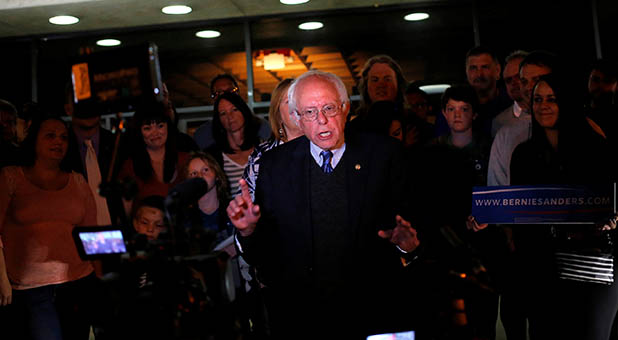Now It’s the Democrats Who Are in Disarray
With the Republican presidential nomination nearly wrapped up for Donald Trump, the question now remains: Which Democrat will be running against him?
And after Tuesday night’s surprise win for U.S. Sen. Bernie Sanders (D-Vt.), the honest answer is that we might not know until the Democratic National Convention. The avowed socialist, who is competing with former Saul Alinsky pen pal Hillary Clinton for the Democratic presidential nomination, has won a number of states, but has had a difficult time picking up the crucial “superdelegates,” which are currently giving the former secretary of state the overall delegate lead.
Here’s how the math shapes up after Tuesday:
Hillary Clinton—1,635 “hard” pledged delegates and 2,202 “soft” total delegates
Bernie Sanders—1,275 “hard” pledged delegates and 1,455 “soft” total delegates
Needed to win the nomination: 2,383 delegates
As you can see, a huge chunk of Clinton’s support comes from “soft” or “unbound” superdelegates, who are free to vote for anyone they want. Some may remember that in 2008, she thought she had the nomination locked up, but lost several hundred superdelegates late in the campaign to then-Sen. Barack Obama.
The Sanders campaign is eager to remind voters of that fact, and is pushing to pull off the same feat in 2016. As the votes were still being tallied in Indiana on Tuesday night, he was in neighboring Kentucky, giving a stump speech in which he said:
“As of today, we have now won 17 primaries and caucuses. We have received some 9 million votes. When we started this campaign, we were 60 points behind Secretary Clinton in national polls. We end up winning the vote of people 45 years of age or younger. That is important because it tells me that the ideas that we are fighting for are the ideas for the future of America and the future of the Democratic Party.”
After he was officially declared the winner in Indiana on Tuesday, he said:
“I know that the Clinton campaign thinks this campaign is over. They’re wrong. Maybe it’s over for the insiders and the party establishment, but the voters today in Indiana had a different idea.”
Sanders is now predicting more victories in the weeks to come in West Virginia, Kentucky, Oregon and California. He said he would fight for the Democratic presidential nomination until “the last vote is cast.”
Meanwhile, Trump and the Republicans will have time to unite, strategize and most importantly, raise money for what is likely to be a very expensive general election battle. Some experts estimate the two sides could spend upward of $1 billion combined before the November election.














































